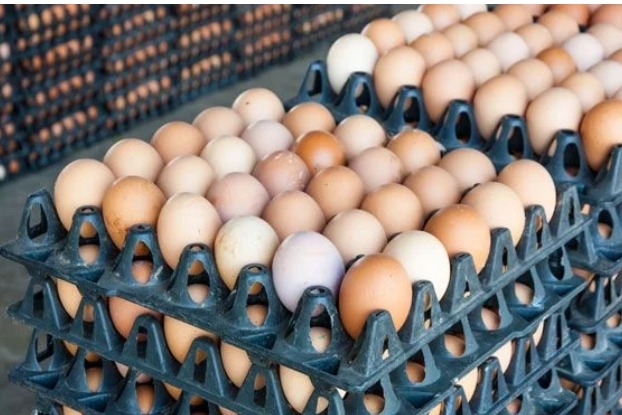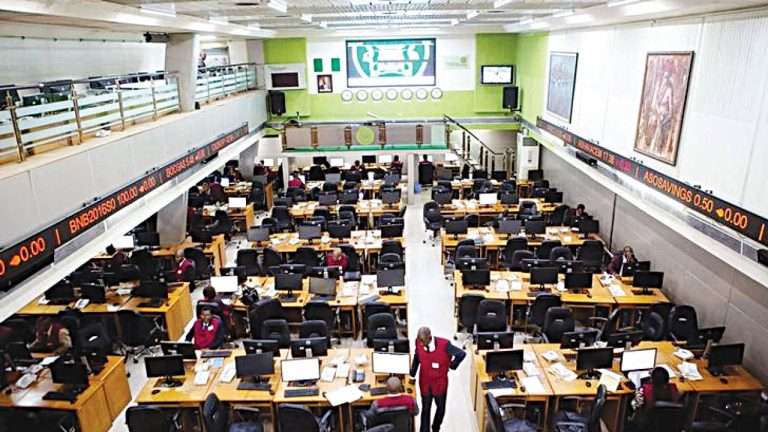Business
Nigeria Imports $3.49bn Fish, Eggs, Milk, Others
Published
2 years agoon
By
Editor
Fish, poultry eggs, milk, dairy and fish products worth $3.49bn were imported into Nigeria in the last two years, according to data from the International Trade Centre.
Within the time under review, fish products worth $2.14bn were imported into the nation, while diary products valued at $1.35bn were brought into the country.
According to the international trade organisation, the fish products included: live fish, frozen fish, fish fillets and other fish meat, whether or not minced, fresh, chilled or frozen; fish, dried, salted or in brine; smoked fish; flours, meals, and pellets of fish.
They also included crustaceans, whether in shell or not, live, fresh, chilled, frozen, dried, salted or in brine, even smoked; flours, meals, and pellets of crustaceans; molluscs, even smoked, whether in shell or not, live, fresh, chilled, frozen, dried, salted or in brine; flours, meals, and pellets of molluscs.
READ ALSO: debtDebt Servicing Gulps N13.17tn Under Buhari, Education Suffers
Flours, meals and pellets of fish, crustaceans, molluscs, and other aquatic invertebrates were also imported.
Dairy products imported included: milk and cream; buttermilk, curdled milk and cream, yogurt, kephir and other fermented or acidified milk and cream; whey; products consisting of natural milk constituents, whether or not containing added sugar or other sweetening matter; butter, incl. dehydrated butter and ghee, and other fats and oils derived from milk; dairy spreads.
Imports also included cheese and curd; birds’ eggs, in shell, fresh, preserved or cooked; birds’ eggs, not in shell, and egg yolks, fresh, dried, cooked by steaming or by boiling in water, moulded, frozen, or otherwise preserved; natural honey; Turtles’ eggs, birds’ nests and other edible products of animal origin.
This is despite an acknowledgement by stakeholders that the continued importation of fish and diary products is depleting the nation’s foreign reserves and ability of local farmers to sell their products.
Recently, the Minister of Agriculture and Rural Development, Mohammed Mahmood, disclosed that the nation’s yearly fish import bill of about 2.4 million metric tonnes of frozen fish was taking a toll on its foreign exchange reserves.
He said, “Nigeria is a very large country and we need about 3.6 million metric tonnes (MMT) per annum but we are able to produce only 1.2MMT through the artisanal, industrial and aquaculture.
“The deficit is being supplemented by frozen fish importation, which is being used to bridge the gap. It is not actually that we are going to have 2.5 million metric tonnes brought into the country, but we have a situation that we supplement with frozen fish imports.”
He added, “However, it is being regulated by the Central Bank of Nigeria because only the CBN governor issues Form-M to anybody who wants to bring frozen fish into the country so that monetary toll in terms of foreign exchange used in importing frozen fish is to be given by the CBN.”
READ ALSO: Debt Servicing To Hit N10.43tn, Economists Slam FG
According to the Federal Government, there were 10 million primary and secondary fish producers in the nation. During an address at the Internal Coordination Meeting among departments of the African Union, Mahmood, stated the nation was working to reduce its fish import bill in collaboration with the private sector through backward integration.
He revealed that to improve local production and reduce imports, the government was encouraging backward integration through commercial aquaculture production for local consumption and exports.
PUNCH
You may like
Business
Stock Market Review: FBN Holdings Leads 41 Others As Investors Gain N811bn
Published
1 day agoon
May 4, 2024By
Editor
FBN Holdings Plc has topped 41 other advanced equities to pull the Nigerian Exchange Ltd.(NGX) market indices up by 1.46 per cent, week-on-week, making investors gain N811 billion.
The market, having opened for four days in the week, following the May Day holiday, had FBN Holdings leading the gainers’ table by 32.68 per cent to close at N27 per share.
Sterling Financial Holdings followed by 27.75 per cent to close at N4.88, while UACN gained 24.60 per cent to close at N15.45 per share.
Julius Berger added 23.76 to close at N72.40, while Flour Mills rose by 20.66 per cent to close at N36.80 per share.
READ ALSO: Teenager Jailed For Life For Murder Of 16-year-old Boy At House Party
Conversely, Nascon Allied Industries Plc led the losers’ table by 17.03 per cent to close at N43.60, University Press trailed by 16.67 per cent to close N2.05 per share.
Neimeth International Pharmaceuticals shed 14.14 per cent to close at N1.70, Berger Paints Plc declined by 9.87 per cent to close at N13.70 and Vitafoam Nigeria lost 9.81 per cent to close at N17 per share.
Meanwhile, 42 equities appreciated in price during the week, higher than 27 equities in the previous week.
Thirty-six equities depreciated in price, lower than 43 in the previous week, while 76 equities remained unchanged, lower than 84 recorded in the previous week.
READ ALSO: Shell Set To Build Gas Pipelines In Oyo
Consequently, the All-Share Index and Market Capitalisation appreciated by 1.46 per cent to close the week at 99,587.25 and N56.323 trillion, respectively, in contrast to 98,152.91 and N55.512 trillion posted last week.
Similarly, all other indices finished higher with the exception of NGX Consumer Goods, NGX Oil and Gas and NGX Industrial Goods which depreciated by 0.26, 0.68 and 0.36 per cent, respectively, while NGX ASeM and NGX Sovereign Bond indices closed flat.
Meanwhile, a total turnover of 1.941 billion shares worth N32.644 billion in 35,807 deals was traded this week by investors on the floor of the Exchange, in contrast to a total of 1.839 billion shares, valued at N34.258 billion, that exchanged hands last week in 37,528 deals.
READ ALSO: Officer Who Shot Man Dead During Fuel Queue Tumult Identified — Lagos Police
The financial services industry measured by volume led the activity chart with 1.496 billion shares valued at N22.453 billion traded in 19,225 deals, thus contributing 77.08 and 68.78 per cent to the total equity turnover volume and value, respectively.
The consumer goods industry followed with 144.722 million shares worth N5.063 billion in 4,966 deals.
In the third place was the conglomerates industry, with a turnover of 109.978 million shares worth N1.539 billion in 2,064 deals.
Trading in the top three equities, namely Abbey Mortgage Bank Plc, Guaranty Trust Holdings Company Plc and Access Holdings Plc, measured by volume, accounted for 898.940 million shares worth N14.314 billion in 5,518 deals.
These contributed 46.31 and 43.85 per cent to the total equity turnover volume and value, respectively.
(NAN)
Business
BREAKIN: NDIC Increases Maximum Deposit Insurance Coverage
Published
4 days agoon
May 2, 2024By
Editor
The Nigeria Deposit Insurance Corporation (NDIC) on Thursday increased the maximum deposit insurance coverage levels for Deposit Money Banks from N500,000 to N5 million.
The Managing Director of NDIC, Bello Hassan, announced this in Abuja at a press conference, stating that it takes effect immediately.
He said, “For Deposit Money Banks, the increase of the maximum deposit insurance coverage from N500,000 to N5,000,000, would provide full coverage of 98.98% of the total depositors compared with the current cover of 89.20%.
READ ALSO: [BREAKING] Coastal Highway: FG To Pay N2.75bn Compensation Today
“In terms of the value of deposit covered, the revised coverage would increase the value of deposits covered by deposit insurance to 25.37% compared with the current cover of 6.31% of total value of deposits.
“The increase of the maximum deposit insurance coverage from N200,000 to N2,000,000, would provide full coverage of 99.27% of the total depositors compared with the current level of 98.76% and would increase the value of deposits covered by deposit insurance to 34.43% compared with 14.38% of total value of deposit, currently covered.
“The increase of the maximum deposit insurance coverage from N500,000 to N2,000,000 would provide full coverage of 99.34% of the total depositors compared with the current 97.98% and would increase the value of deposits covered by deposit insurance to 21.04% compared with 10.77% of total value of deposit, currently covered.”
READ ALSO: Mother Of Four Hacked To Death By Neighbour, Son In Edo
Hassan also stated that raising the maximum deposit insurance coverage for primary mortgage banks from N500,000 to N2,000,000 would provide full coverage for 99.99% of total depositors and increase the value of deposits covered by deposit insurance to 43.10% of the total deposit value, up from the current 40.60% cover.
The Corporation has also raised the maximum pass-through deposit insurance coverage for subscribers of Mobile Money Operators from N500,000 to N5,000,000 per subscriber.

Chairman of Dangote Industries Limited, Aliko Dangote has said that the devaluation of Naira created the biggest mess for the company in 2023.
Speaking at the annual general meeting of Dangote Sugar Refinery, Dangote said this affected lots of companies in the country.
He said: “We are doing whatever it takes to make sure that at the end of the day, we will be paying dividends because if you look at our dividends last year, it was almost 50 percent more so we will try and get out of the mess.
READ ALSO: Ex-policeman Who filmed Wife Having Wex With Her Superior Found Guilty Of Stalking
“The biggest mess created was actually the devaluation of the naira from N460 to N1,400. You can see almost 97 percent of the companies, especially in food and beverages businesses, none of them will pay dividends this year for sure but, we will try and get out of it as soon as possible.
“We want to see that at the end of the day, no matter how small, we will be able to pay some dividends, especially if there is a rebound of the naira.”

Man Dies On Top Of Married Woman In Akure

Soldier Dismissed For Sleeping With Colleague’s Wife

Kenya Deports Nigerian Captured On CCTV Assaulting Woman In Wheelchair [VIDEO]
Trending

 Politics5 days ago
Politics5 days agoWhy Candidate Who Needs Interpreter Can’t Be Edo Gov – Shaibu

 News4 days ago
News4 days agoEx-policeman Who filmed Wife Having Wex With Her Superior Found Guilty Of Stalking

 Metro4 days ago
Metro4 days agoMother Of Four Hacked To Death By Neighbour, Son In Edo

 News4 days ago
News4 days agoWhy Abia Policeman Dropped His Rifle, Uniform, Walked Away From His Job – Report

 Metro4 days ago
Metro4 days agoPolice Foil Cult Initiation In Edo, Arrest 35 Suspects

 News3 days ago
News3 days ago15-year-Old Public School Student Scores 362 In UTME

 Metro4 days ago
Metro4 days agoOutrage As Masquerades Brutally Flog Nurse Until She Falls In Gutter In Enugu [PHOTOS]

 News3 days ago
News3 days agoJUST IN: Police Arrest Mastermind Of Abuja-Kaduna Train Attack

 Headline1 day ago
Headline1 day agoPHOTOS: Moment 23-year-old Miss Ecuador Beauty Queen Is Gunned Down In Hail Of Bullets

 Politics5 days ago
Politics5 days agoEdo Poll: Youth Leader Tackles Orbih, Shaibu Over Anti-Ighodalo Stance, Wants Them Suspended





















